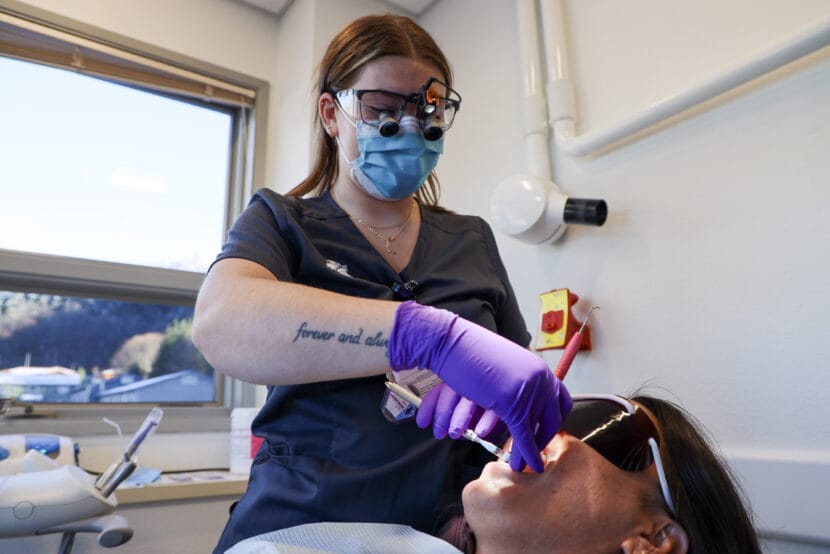
Robert F. Kennedy Jr. is poised to be the country’s new Health and Human Services secretary with the incoming Trump administration. If confirmed, Kennedy has pledged to advise all U.S. water systems to remove fluoride from public water.
But, a growing number of cities in the U.S. have already done that on their own — and residents’ teeth offer a preview of how that policy could affect dental health nationwide. Juneau pulled fluoride from its tap water nearly two decades ago.
On Thursday in Juneau, Dr. Yvonne Tijerina-Burleson used a tiny brush to paint topical fluoride on a patient’s teeth at SouthEast Alaska Regional Health Consortium’s Dental Clinic. She explained what she was doing out loud.
“Dry, dry, dry. Paint, paint, paint,” Tijerina-Burleson said. “Simple, with some amazing benefits.”
The patient chose a marshmallow-flavored treatment.
“It smells really good — these would be great candles,” she said, laughing.
Applying topical fluoride is a typical practice for most dentists across the U.S. But in Juneau — it’s an especially critical one. That’s because it hasn’t been in city water for nearly two decades. And since then, data shows kids in Juneau have started getting cavities at a higher rate.
“Fluoride has as we would say, a carioprotective effect, like it can prevent cavities, it can slow down the disease process,” said Dr. Dane Lenaker, the medical director of dental services for the SEARHC clinic. “Fluoride can help remineralize and strengthen the teeth.”
Around 70% of the U.S. population has access to fluoridated tap water. Dental experts and studies say it helps prevent cavities.
“Fluoride, if you’re not getting it in the water system, and it’s not getting incorporated into your teeth that way – this is another way that it basically gets painted onto your teeth,” Lenaker said.
Public health officials say putting a small amount of fluoride in the water supply is an easy and cost-effective way for large-scale cavity prevention. But some researchers and critics – like RFK Jr. – argue it may lead to health issues.
RFK Jr. called fluoride industrial waste and associated it with issues like lower IQ in children. There is some evidence of that at high levels of exposure, but not at the level that goes into U.S. water supplies.
There are conflicting narratives, but one thing is clear — the U.S. is seeing more and more cities opt out of fluoridated tap water.
About two decades ago, Juneau residents overwhelmingly voted to remove fluoride from the local water supply. If Juneau’s dental health now is any indicator of what’s in store for cities that might follow RFK Jr.’s advice — America could be seeing a lot more cavities.
What does research say?
“I think Juneau offered us a good example of some of the challenges we set ourselves up for when we decided to stop fluoridating the water,” said Jennifer Meyer, a public health researcher.
Meyer conducted a study published in 2018 that shows that kids in Juneau have needed more dental work since they stopped getting fluoride from the water.
“Places that are going to cease fluoridation, just hold on to your pocketbook, because it’s going to get expensive,” she said.
The Centers for Disease Control and Prevention would agree with that claim. Meyer’s study focused specifically on the teeth of children under six in Juneau. She used a set of Medicaid dental claims to get data for about 1,900 kids.
“What we know happens is, over time, you start to see kids with more and more decay, and some with some really advanced decay,” she said.
Her study found that when the water had fluoride in it, kids had an average of 1 1/2 cavity-related procedures per year. But, once it was gone, that went up to about 2 1/2 procedures a year.
Her Juneau-specific study’s conclusion is not far off from what other researchers say. The CDC calls the fluoridation of drinking water one of the greatest public health interventions of the 20th century, attributing it to averting millions of cavities in the decades it’s been implemented.
Another study by the State of Alaska showed a small sample size of children in Juneau had a higher increase in cavities compared to the state as a whole in years after fluoride was removed from the water.
The American Dental Association shared a statement this fall that endorsed water fluoridation, saying there is clear and compelling evidence around the benefits of it.
Not everyone is convinced.
David Ham is one of the advocates who wanted to remove fluoride from Juneau’s water. He said he doesn’t have a problem with fluoride on his teeth. He has a problem with drinking it.
“I used a fluoride toothpaste, and then I could spit out the toothpaste and not swallow it and ingest a questionable substance into my body,” Ham said.
He said he sees the value in fluoride but argues that it can be administered in ways other than putting it in the water supply. But not everyone has access to regular dental care or fluoride pills. Health officials say fluoridated water is especially important for kids and vulnerable populations.
“We all want to have a silver bullet solution to a problem. But there isn’t, because life isn’t like that. Fluoride, this fluoride issue, is not like that,” Ham said. “There are steps you can take that don’t involve telling everybody to drink fluoride.”
Now, no one in Juneau drinks fluoride — it’s an all-or-nothing situation. And the city’s experience shows that when people have to opt in to use fluoride — it can lead to more cavities.
Correction: A previous version of this story stated the wrong year in the photo caption.
